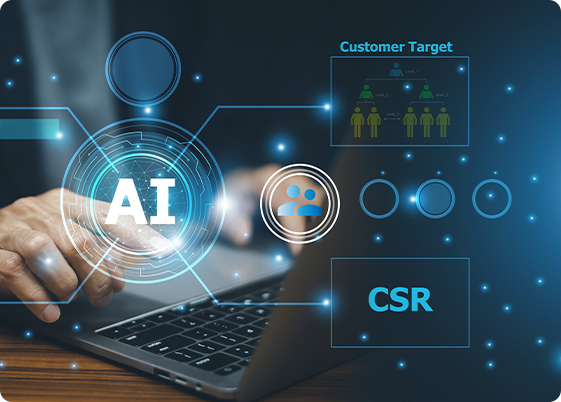What Does AI in Customer Service Mean?
AI in customer service refers to the integration of advanced technologies to automate, enhance, and streamline customer interactions. AI tools in customer service can analyse large amounts of data, learn from patterns, and offer personalised support to customers. These tools include AI-powered chatbots, virtual assistants, predictive analytics, and sentiment analysis tools, which allow businesses to manage customer interactions more efficiently.
Companies like HGS India are leveraging these AI tools to offer exceptional customer support across multiple touchpoints, helping brands meet the growing demands of today's tech-savvy customers.
Benefits of Using AI in Customer Service
- Improved Efficiency: AI tools handle repetitive tasks, freeing up human agents to focus on more complex issues.
- Cost Reduction: By automating routine tasks, businesses can reduce staffing costs.
- Personalisation: AI can analyse customer data and provide tailored recommendations or solutions.
- 24/7 Availability: AI-driven systems like chatbots ensure customer support is available at all hours, improving service accessibility.
- Enhanced Customer Insights: AI analytics tools help businesses understand customer behaviour and preferences, leading to improved service.

Best Ways to Use AI Tools for Customer Service
Here are six key ways on how to use AI in customer service:

1. 24/7 Customer Support with AI Chatbots
AI-powered chatbots are one of the most widely used AI tools for customer support. These virtual assistants can engage with customers via text or voice on websites, mobile apps, and social media platforms, providing real-time responses to enquiries.
With AI chatbots, businesses can offer 24/7 customer service without the need for human agents to be on call around the clock.
Example: An AI chatbot integrated with an e-commerce website can help customers track their orders, provide updates on stock availability, or offer personalized product recommendations based on past purchases.

2. Multilingual Customer Service
In today's global market, providing support in multiple languages is a necessity. Knowing about Generative AI and other language processing technologies and translation services enable businesses to deliver multilingual customer support.
Using AI for customer service can break down language barriers by automatically translating customer queries and responses in real-time.
Example: AI-based customer service systems used by global companies like HGS India can automatically switch between languages during live chat interactions, making it easier for customers from diverse regions to communicate effectively.
3. Personalized Customer Interactions with AI-Powered Recommendations
AI tools can personalise customer interactions by analysing data from previous interactions, purchases, and preferences. This data helps businesses offer tailored recommendations that align with customers' needs and interests.
Using AI for contact centres and AI-based customer support systems, companies can suggest relevant products or services, offer personalised discounts, and proactively engage customers based on their browsing history.
Example: Streaming services like Netflix and Spotify use AI to recommend content based on users' previous activity, offering a personalised customer experience.

4. AI-Powered Sentiment Analysis for Customer Feedback
Sentiment analysis is a powerful AI tool that analyses customer feedback, reviews, or social media mentions to determine the sentiment behind them—whether positive, neutral, or negative.
AI tools for customer support can process large volumes of feedback in real-time, providing businesses with actionable insights into customer satisfaction and areas for improvement.
Example: A company using AI-based sentiment analysis can detect negative feedback on social media about delayed shipping and address the issue before it escalates, preventing customer dissatisfaction.

5. Predict Customer Needs Using AI Analytics
Predictive analytics powered by AI helps businesses anticipate customer needs and proactively offer solutions. AI tools analyse customer data such as purchase history, behaviour patterns, and demographics to predict future needs, allowing businesses to offer personalised solutions before customers even ask.
This use of AI in customer service is particularly valuable in industries like e-commerce, where AI-driven systems can recommend products based on a customer’s past buying behaviour or even forecast potential issues, such as stock shortages, to prevent customer frustration.
Example: E-commerce platforms can use AI to analyse browsing behaviour and predict the likelihood of a customer making a purchase. Based on these insights, they can offer discounts or personalised offers, boosting conversion rates.

6. AI in Quality Control and Agent Training
AI tools can also be utilised for quality control and agent training. By analysing past interactions, AI systems can assess the performance of customer service agents, identifying areas where they excel or need improvement.
Using AI for agent training helps businesses develop more effective training programmes, as it provides data-driven insights into common challenges faced by agents. Additionally, AI in customer support tools can offer suggestions for improving agent responses.
Example: A contact centre using AI might analyse customer service calls and identify recurring issues where agents struggle, then create targeted training sessions based on those insights.
Conclusion
The use of AI in customer service is transforming the way businesses interact with customers. By integrating AI tools such as chatbots, sentiment analysis, and predictive analytics, businesses can improve customer satisfaction, reduce costs, and gain valuable insights into customer behaviour. AI for customer care is not just about automating processes; it's about providing a personalised, seamless, and efficient experience that meets the growing demands of today's digital-savvy customers. As AI continues to evolve, its role in customer service will only become more critical, offering digital transformation best practices and creating new roles within artificial intelligence careers.
Frequently Asked Questions
What is the best AI tool for customer service?
The best AI tool for customer service depends on the specific needs of the business. Popular tools include chatbots like Zendesk and Intercom, which provide 24/7 support, and LivePerson, known for AI-powered messaging.
What are the negative effects of AI in customer service?
Negative effects of AI in customer service include job displacement, where automation replaces human agents. AI may also lead to impersonal customer experiences if not properly implemented, creating frustration if it lacks empathy or understanding.
What is the future of AI in customer service?
The future of AI in customer service looks promising, with AI-driven chatbots, predictive analytics, and sentiment analysis set to become more sophisticated. Businesses will increasingly use AI to personalise experiences, improve service speed, and provide proactive support.
How can AI help customer success?
AI helps customer success by predicting customer needs through analytics, offering tailored solutions, and automating repetitive tasks. By providing timely, personaliszed interactions, AI tools can improve customer satisfaction and retention.
 India
India Canada
Canada Colombia
Colombia Jamaica
Jamaica Philippines
Philippines UK
UK US
US SA
SA



